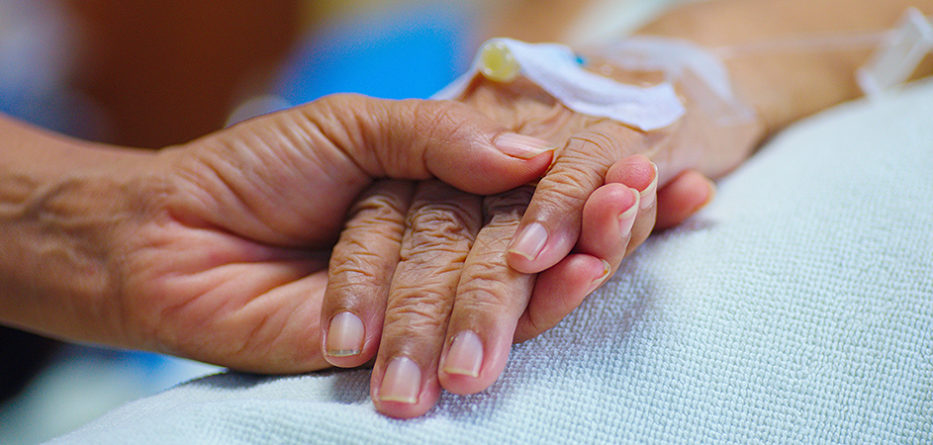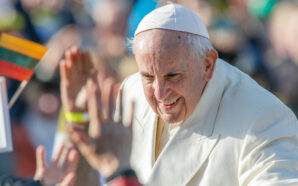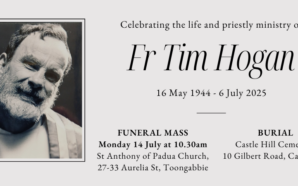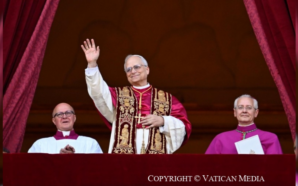Homily for the 25th Sunday in Ordinary Time
Readings: Wisdom 2:12,17-20; Psalm 53:3-6,8; James 3:16-4:3; Mark 9:30-37
19 September 2021
Listen at https://soundcloud.com/frank-brennan-6/homily-19921
On this 25th Sunday in Ordinary Time, I would like to commence with a reflection on today’s Psalm 53:
The Lord upholds my life.
O God, save me by your name;
by your power, uphold my cause.
O God, hear my prayer;
listen to the words of my mouth.
The Lord upholds my life.
For proud men have risen against me,
ruthless men seek my life.
They have no regard for God.
The Lord upholds my life.
But I have God for my help.
The Lord upholds my life.
I will sacrifice to you with willing heart
and praise your name for it is good.
The Lord upholds my life.
During the week I was involved in the public debate surrounding the Queensland Parliament’s passage of its Voluntary Assisting Dying Bill.[1] It was no surprise that Queensland, following the trend of other states, opted for some form of medically assisted suicide. But the disheartening spectacle was that not one single amendment suggested by some of the major providers of health services, aged care services and palliative care services in that state was accepted. Furthermore, in the parliamentary debate, though a string of speakers often spoke in support of such amendments, usually there was only one member of the ALP government or the Greens to respond, objecting to the amendments without any semblance or pretence of rational debate. The antipathy to the church providers of health services was palpable. At times it was downright insulting and hurtful.
I will give but one example. One of the largest and finest hospitals in Queensland is the Brisbane Mater Hospital. Its reputation is well deserved. The Mater Hospital joined with other church health providers agreeing to a provision in the legislation that they “must not hinder the person’s access at the facility to information about voluntary assisted dying”. They objected to a further provision which would have allowed access to their facilities by health practitioners or employees of an “official voluntary assisted dying care navigator service” even if these persons were not accredited by the hospital. You will appreciate that a well-run health facility determines what services it will provide professionally and who will be accredited to provide those services.
Like their Victorian counterparts who have lived with VAD (voluntary assisted dying) laws in place these past four years, these church health providers assured the Queensland parliamentarians that though they would not provide VAD on their premises, they would have in place a system that would respond respectfully and compassionately to any questions from a resident or patient about VAD. This would include co-ordinating transfer of care to other providers if a patient/resident wished to pursue VAD. The church providers would not impede access to the provision of VAD elsewhere.[2]
Eleven members of parliament spoke strongly in favour of the amendment pointing out that hospitals like the Mater Hospital have the highest standards and are greatly respected in the community. Such hospitals would always put the patient first though there would be some services like assistance with a voluntary death that they would not wish to provide on site.
Here was the one and only response from the Greens Member Mr Michael Berkman before the debate was shut down by the Deputy Premier Dr Stephen Miles. Mr Berkman told the story of Tanya who had “been given advice that if her cancer, which is now in her lung and abdomen, spreads further there is a very real chance it could cause a bowel obstruction and, given the medical experts she has been consulting and relying on, there is a very real possibility that if she needs surgery to address that it would happen at the Mater. She was also told that there is a real chance that if she had that surgery at the Mater there may not be an opportunity for her to leave. Whether or not this law is in place in time for someone like Tanya to access it, an amendment like this would mean that she would effectively be trapped in the hospital to which she needed to go to seek that treatment. Our health system is already very dependent on Catholic providers and other faith based institutions. … I think it is unconscionable for us to see amendments like this passed that would ultimately leave people like Tanya effectively trapped in hospital. For a hospital to become a prison for a person at the end of their days is completely against the intention of this legislation.”[3]
This was simply irrational anti-religious bile, suggesting that the Mater Hospital would imprison patients. There is no way that Tanya would ever be trapped inside the Mater Hospital. Should she choose to go to the Mater for surgery, she would be accorded the best health care with her dignity being fully respected. Mr Berkman’s rant had nothing whatever to do with the reasoned amendment being put forward by 11 speakers both to make voluntary assisted dying generally available in the community while maintaining the integrity and cultural ethos of iconic institutions like the Mater Hospital.
Putting an end to the debate on the amendment, the Deputy Premier Dr Stephen Miles offered this irrelevant observation:”[T]his clause that we are voting on right now only relates to the right of a person to have information; it does not relate to the provision of the service itself. …[I]t is very important to acknowledge that people very often do not have a lot of say in the entity that they end up in and in many circumstances the entity they end up in is their home; it is not just an institution.”[4] Some of the finest nursing homes and public hospitals in this country are run by church providers who well know the difference between a home and an institution.
The amendment was lost by 33-56. In the end the whole bill was passed without amendment by 61-30.
Now, there’s no doubt we religious folk are on the nose with a lot of people in our society. There are understandable reasons for this. Regardless of church failings, I don’t think anyone can reasonably question the commitment of entities such as the Brisbane Mater Hospital to the provision of the best possible health care. Until now, it has been accepted that not every hospital and aged care facility has to offer voluntary assisted dying on site. For many people for whom their nursing home is their home, in fact their last home, it is important that they be able deliberately to choose a place where medically assisted suicide is not practised while providing respectful and timely removal of residents to other facilities should they change their minds and wish to avail themselves of a death dealing drug or injection.
In today’s gospel from Mark, we hear the second of three prophecies of Jesus’ passion. The disciples don’t understand the talk of passion, death and resurrection, and they’re too afraid to ask him. Easier to start a debate amongst themselves about who is the greatest. Who had the numbers in the Queensland debate? Who had the best arguments? Who had the best tactics? Embarrassed to admit to Jesus a contest about who is the greatest, the disciples remain mute when he asks them what they have been up to. So he calls the Twelve to him and says, “If anyone wants to be first, he must make himself last of all and servant of all.” Scripture scholar Jose Enrique Aguilar Chiu says, “Jesus does not repudiate prominence and greatness, but he redefines them.”[5] How do we make sense of such a redefinition of prominence and greatness in the wake of what has played out between church and state in the Queensland Parliament this week? To make his point, Jesus puts his arms around a little child declaring, ‘Anyone who welcomes one of these little children in my name, welcomes me”. Chiu tells us that this action of Jesus shifts the disciples’ focus of attention: “they should not be concerned about who is the greatest among them, but about the weakest and most humble member of the community”.[6]
At the canonisation of John Henry Newman two years ago, Prince Charles observed: “In the age in which he attains sainthood, his example is needed more than ever – for the manner in which, at his best, he could advocate without accusation, could disagree without disrespect and, perhaps most of all, could see differences as places of encounter rather than exclusion.”[7]
Our political power as Church, even as a long-time proven provider of outstanding health services, is less than it has been for a long time. We must redouble our efforts to serve those who are the weakest and most humble in our community. We must see what we can do to improve our commitment to service for all persons, regardless of our disagreements about voluntary assisted dying. As scripture scholar Brendan Byrne writes when reflecting on today’s gospel scene of Jesus with the child in the presence of the disciples: “We are now witnessing the end of that ‘Constantinian church’ in which leaders were accorded honours and symbols of rank more reflective of worldly power than the values of Jesus and where the institution itself was built into the fabric of society. The pain that goes along with the loss of status and honour is perhaps akin to that experienced by the disciples of Jesus as they struggled both to hear and to resist what he was saying. Like them, we are all on the way to Jerusalem with Jesus.”[8] Let’s not abandon our commitment to first rate health care and aged care, affirming a life ethic consistent with our tradition. But let’s do it with humility knowing how disrespected we are by some of those who exercise power in the name of the people, without any semblance of rational debate.
The Lord upholds my life.
For proud men have risen against me,
ruthless men seek my life.
They have no regard for God.
The Lord upholds my life.
[1] As the final vote was being taken, I was interviewed on ABC Radio at https://www.abc.net.au/radio/brisbane/programs/drive/vad/13546674
[2] See my piece at https://www.eurekastreet.com.au/article/three-ways-queensland-s-assisted-dying-bill-goes-too-far
[3] Queensland Parliament, Hansard, 16 September 2021, p. 2843
[4] Queensland Parliament, Hansard, 16 September 2021, p. 2844
[5] Jose Enrique Aguilar Chiu, ‘Mark’, The Paulist Biblical Commentary, Paulist Press, New York, 2018, p.972 at p. 1003
[6] Ibid.
[7] Prince Charles, John Henry Newman, ‘The Harmony of Difference’, available at https://www.vaticannews.va/en/vatican-city/news/2019-10/newman-canonization-prince-charles-editorial-britain.html
[8] Brendan Byrne, A Costly Freedom, St Pauls, 2008, p.153
Fr Frank Brennan SJ is the Rector of Newman College, Melbourne, and the former CEO of Catholic Social Services Australia (CSSA). He has been appointed a peritus at the Fifth Plenary Council of the Australian Catholic Church.








